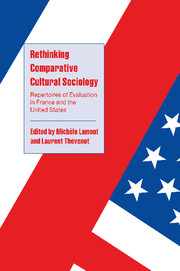Book contents
- Frontmatter
- Contents
- Notes on contributors
- Acknowledgements
- 1 Introduction: toward a renewed comparative cultural sociology
- Part I Race, gender, and multiculturalism
- Part II The cultural sphere: publishing, journalism, and the arts
- Part III Political cultures and practices
- 8 Community and civic culture: the Rotary Club in France and the United States
- 9 Forms of valuing nature: arguments and modes of justification in French and American environmental disputes
- 10 Comparing models of strategy, interests, and the public good in French and American environmental disputes
- Conclusion: Exploring the French and the American polity
- References
- Index
10 - Comparing models of strategy, interests, and the public good in French and American environmental disputes
Published online by Cambridge University Press: 26 March 2010
- Frontmatter
- Contents
- Notes on contributors
- Acknowledgements
- 1 Introduction: toward a renewed comparative cultural sociology
- Part I Race, gender, and multiculturalism
- Part II The cultural sphere: publishing, journalism, and the arts
- Part III Political cultures and practices
- 8 Community and civic culture: the Rotary Club in France and the United States
- 9 Forms of valuing nature: arguments and modes of justification in French and American environmental disputes
- 10 Comparing models of strategy, interests, and the public good in French and American environmental disputes
- Conclusion: Exploring the French and the American polity
- References
- Index
Summary
To expand our comparative understanding of local disputes, political culture, community, and the public good in French and American cases of environmental dispute, we need to supplement the previous chapter's comparison of the content of argumentation and modes of justification in several ways. In this chapter, we compare facets of the same two cases of environmental disputes in France and the United States (presented at the beginning of Chapter 9) which illuminate further how the disputants approached the work of defending or opposing the projects.
Specifically, we compare the disputants' varying “strategic” practices of selecting and using arguments, and the models of coordination and the public good which inform their advocacy of their causes and “interests.” We begin by considering in what sense the disputants in both cases were “strategic” (or were denounced as being strategic) in constructing arguments, switching between or combining arguments, or creating complex organizational arrangements to distribute or diversify the types of arguments and rhetoric each person or group employed. Then we explore in depth the conceptual models – either explicitly stated or implicitly displayed by the disputants in each case – of the connection between the actors' “interests” and some configuration of the “public good” or some vision of “community,” comparing how the use of these models varies within cases and between the two countries.
- Type
- Chapter
- Information
- Rethinking Comparative Cultural SociologyRepertoires of Evaluation in France and the United States, pp. 273 - 306Publisher: Cambridge University PressPrint publication year: 2000
- 36
- Cited by

